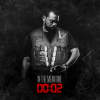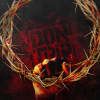The first time I really heard Don Trip was also the first time I saw him. Bearded, with no shirt on, he was rapping "Letter to my Son," his now semi-viral song about not being able to see his kid. It's a harsh, openly emotional song. It's not subtle as much as it just feels and sounds real. Don Trip is a good writer and a good rapper, but he also has a great voice. It's the kind of craggy, uncomfortable thing that stands out whenever it pops up. Since the release of "Letter to my Son," Trip has released a whole lot of mixtapes, including one of my personal favorite releases this year, Step Brothers, an album with Starlito that is loosely based on samples from the Will Ferrell and John C. Reilly movie of the same name. Even at its darkest moments, (surprisingly there are plenty), it sounds like the rappers are having fun making songs together. It's not just another DJ Khaled-style cut-and-paste, but an actual in-studio collaboration done by dudes who aren't afraid to admit that they actually like rapping. Don Trip has a lot more music coming, so I decided to check in with him about how life's been since "Letter to my Son."
You’re extremely prolific. You released two mixtapes in the same day. Are you constantly in the studio? Yeah, I mean I’ve been this way for the last…well, probably like the last ten years, and now that I got that light—that people are starting to see that I’m like this—I actually got three tapes ready right now that I don’t even plan on releasing for a second.
Is it easier to keep working now that you know you’ve got an audience? I try to look at it like I got more work to do. I go places out of town where everybody don’t know me, and that makes me feel like I gotta keep going. The way I want to approach it, I want everybody to realize who I am and realize they been sleeping on it. I want them to go back and then say, Oh he got 17 tapes that we been slacking on.
How’s touring been? I’m on the BET Black College Tour right now. It’s been a learning experience. The kids have probably never seen me before besides probably like five people in the crowd. I get to see how they react to music they’ve never heard before.
You’re from Memphis, but you don’t sound similar to any other Memphis rapper I’ve heard. Musically I’d say I was like a sponge, you know? I listened to everything. I really didn’t listen to Memphis music as much. I was a really big Tupac fan and a big Jay-Z fan. When I started recording I didn’t want to sound like none of what was coming out from Memphis. I wanted to stand alone. I didn’t want anyone to say, Oh he sounds like he’s from Memphis. Either you like it or you don’t. If you do or don’t like it, it’s not just because I’m from Memphis, it’s because of me.
But you still work within the Memphis scene, right? Yeah, I like to work with everybody. I keep business and personal separate. When I meet people…if you grind like I grind then I feel like we can work it out. I’m never too difficult to work with.
How did the collaborations with Starlito come about? We met on the road with Gotti. We was both familiar with each other’s music and we sat down and said, You know, it’d be a good look if we did a tape together and from that instant we went to work. We both found time and in a matter of like three sessions we knocked out [Step Brothers].
How did you decide on Step Brothers as the concept? Was it just a convenient title or are you both huge fans?> It was a little bit of both. I like the movie, but I think that’s one of Star’s favorite movies. He knew it line for line. I’m like, Man, I don’t know what’s wrong with this guy. It was interesting because we could make certain things…Step Brothers is a comedy. It’s not serious at all. It was interesting for us to be able to take excerpts out and make them tie into actual life. On “A Time to Kill,” the sample sounds eerie, it sounds serious, when you hear it on the tape it sounds serious. Like, if you didn’t know what that movie was, you would think something tragic happened.
Is there going to be a sequel? Yeah, we’re going to do a Step Brothers II. We didn’t want to come out with a Step Brothers II a matter of months after Step Brothers, we’re going to let it soak in a little bit, we got a couple more videos to release.
The thing that struck me about the mixtape was that it really seemed like you guys were having fun rapping together. The number one thing we didn’t want to do was email each other songs back and forth. We do that with everybody else. We felt that the only way it was going to be significant is if we took time out of schedules to actually do it. It’s three hours from Memphis to Nashville, so I drive to Nashville for the first session and he drove down here to Memphis for the last two sessions. Actually, the third session was just mixing, so we worked it out to where we actually sat with each other. Every song on that tape—there’s no song I did and then waited for him to come hear the song. We did each song with each other present.
You can tell. Sometimes you guys are even going word for word. There’s a couple records we didn’t even write. “Hot Potato,” we was actually standing in the booth together and we went on the fly. He would sing a bar or half a bar and I would return with a bar.
Are you going to do the next one the same way? Of course. If it ain’t broke, don’t fix it. I feel like the main reason people can rock with the tape is the fact that you can hear our chemistry, and the only way we got that is because we chose to actually sit in the studio with each other.
Are you freestyling or writing most of the time? Oh, no. I never freestyle. The way I work, I don’t write until I’m in the studio. I don’t like to write before it's time because when it's time to spit it, I don’t remember how I approached it. I don’t rap it like…if I can’t feel it, then I’m not doing it. I feel like that’s one of the few things I can offer that ain't being offered all around the board. I can show you that I feel this. I love music, so I’m expressing it instead of just rapping.
I think that’s why “Letter to my Son” made a lot of people take notice. It’s a very emotional song. Do you feel like there’s pressure on you to be the guy that is always making the serious, intense song? There are pros and cons to it. The good thing about it is that it opens they eyes and they see that I do pour my heart out when I record. But the con to that is that, that’s what people want. They want “Letter to my Son Part II” and Part III and Part IV…That’s like asking for me to be the most miserable artist ever.
Now that you’re signed to a major label, is there pressure to deliver a single? I don’t know how to go in and make one particular kind of song. I let my music do what it do. If I go in and the beats speak to me and I hear it…I heard “Letter to my Son” and that’s what came out. I don’t go in and say, Hey we gotta make the next radio single. I don’t even know how to do that.
We were talking earlier about how you don’t sound like anyone from Memphis. Is there anyone that was really influential to you that people might not expect? Jadakiss. I learned how to count bars from Jadakiss. He didn’t teach me a lesson and show me, but I used to study Jadakiss verses.
That’s interesting. He can be a great punchline rapper, too. I feel like when you want to, you’re good at that as well. I try not to do it as much. When punchlines are popular then it starts being all people will do. Like you could listen to a song and no two bars had anything to do with each other. They was just punchline after punchline after punchline. I could do that when I was younger, but now that I’m older I feel like every song is supposed to be a picture. If I’m showing you a picture, I’m not being a comedian. I would like to look at my music as a documentary, not as a comedy. Of course you want comedic relief in it, but I don’t want my humor to overpower the point I’m trying to make.
A lot of dudes seem content to not make any sense. If they said it instead of rapped it, you would look at them confused like, What are you talking about? You would think they was bouncing off the walls.

